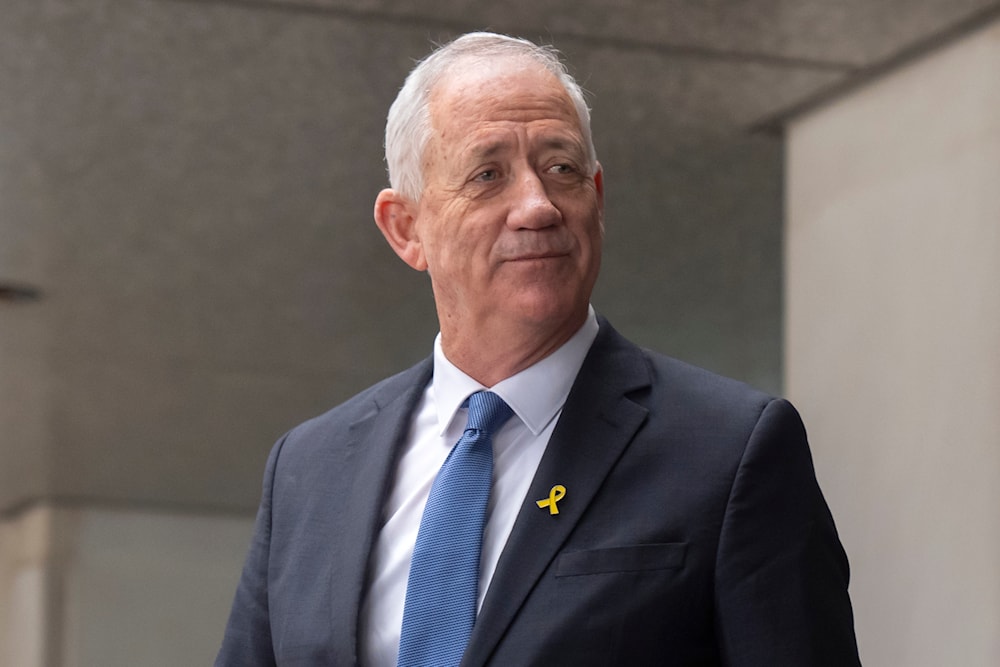'Israel' on the brink of civil war, Gantz warns against amendments
Amid escalating divisions, Benny Gantz met with Justice Minister Yariv Levin in a bid to block the legislation, warning of potentially catastrophic consequences for "Israel's" stability.
-

Benny Gantz, a key member of "Israel's" War Cabinet and the top political rival of Israeli Prime Minister Benjamin Netanyahu, leaves after a meeting at the State Department, on March 5, 2024, in Washington. (AP)
Benny Gantz, leader of the National Unity party, met with Justice Minister Yariv Levin on Wednesday evening as Knesset deliberations continued over changes to the committee responsible for selecting judges. According to the Israeli Public Broadcasting Corporation, this amendment is a key pillar of the controversial judicial reforms, which are expected to be finalized by Friday.
During the meeting, Gantz urged Minister Levin to halt the legislation, warning that "Israel is on the brink of civil war." However, Levin refused to relent. Sources close to him argued that the proposal “intended to heal the rift in the nation."
Meanwhile, Gantz sent Prime Minister Benjamin Netanyahu a letter, urging him to reconsider the divisive amendments. In protest of the legislation’s passage without broad consensus, opposition parties signaled a possible boycott of the third and final voting session.
According to quotes published by Channel 12, Gantz wrote to Netanyahu: "I’m appealing to you as someone who bears the responsibility of acting on behalf of all citizens of this country."
"Our society is wounded and bleeding, divided in a way we have not seen since October 6 [2023]. Fifty-nine of our brothers and sisters are still captive in Gaza, and our soldiers, from all political factions, are fighting on multiple fronts."
'Civil war closer than ever'
Divisions within the occupation entity have intensified following Netanyahu's decision to dismiss Bar, the Supreme Court's temporary freeze on that decision, and the government's unanimous vote of no confidence in Attorney General Gali Baharav-Miara. These actions have sparked widespread public outrage.
In a statement on Monday, Gantz said, "It’s true that there are many security challenges from abroad, but Israel’s security is at risk because of the internal division."
“When we tear the people apart from within, we strengthen Hamas’ stubbornness and give it hope that it can break us. The most urgent matter now is the return of our kidnapped soldiers," he maintained, adding, “Anyone who ignores this now is knowingly harming the security of the state. What is happening here is laying the foundation for the next catastrophe and fueling our enemies."
Meanwhile, former Israeli army Chief of Staff Gadi Eisenkot stated that "while most Israeli citizens support the immediate return of the captives and the continuation of the decisive war on terrorism until its defeat, the government is focused on the struggle against the gatekeepers —referring to the heads of the security services—and the judicial system."
Details of the new amendments
The new bill outlines that the judicial selection committee consists of nine members, including the President of the Supreme Court, two other justices, the Justice Minister—who will chair the committee—and an additional minister chosen by the government.
The committee will also include two Knesset members (one from the coalition and one from the opposition) and two public representatives, one selected by the coalition and the other by the opposition.
According to the Israeli Public Broadcasting Corporation, the amendment seeks to shift the judicial appointment process from a committee with significant judicial influence to a more politically driven body, eliminating the Bar Association’s role in the decision-making process.
The law further stipulates that the appointment of judges at all judicial levels will require the approval of at least five out of the nine committee members. However, the selection of Supreme Court judges will require a majority vote that includes at least one representative from both the coalition and the opposition.
It is important to note that the proposal to amend the "judicial authority laws" and weaken the judicial system, introduced by a coalition of nationalist, religious parties and the Likud Party led by Netanyahu, has triggered protests and plunged "Israel" into a deep political crisis.

 4 Min Read
4 Min Read








